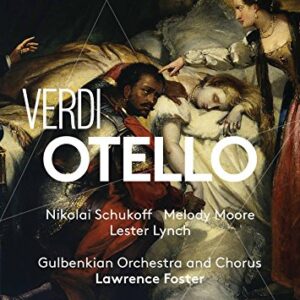What to make of this dark horse candidate into the Otello sweepstakes? Well, were I to have been in Lisbon in July, 2016, and had I been suddenly invited to the recording sessions for this release, I would have been tickled pink. The Gulbenkian Orchestra and Chorus are under Lawrence Foster’s tight rein, playing and singing with accuracy, and hardly a note goes astray. Our Iago, Lester Lynch, has an ample, Verdian voice and applies an audible sneer in his exchange with the somewhat wimpy Rodrigo; and our Otello, Nikolai Schukoff, though on the narrow-voiced side for the role, sings his “Esultate” positively on key, with every word and note articulated. He may not sound particularly Italianate, but neither have many Otellos of the past. The Cassio of JunHo You is hard-working and mellifluous.
The further one gets into the opera, the less convincing the performance is. The orchestra sounds like a finely rehearsed group that has never played this music before–this is a fine run-through, with slow tempos (10 minutes slower than Kleiber, 17 minutes slower than Toscanini) and four-square, cautious leadership. Nothing is inspired; individual scenes do not grip. And when Schukoff makes his second entrance with “Abasso le spade!” the lack of darkness and heft in his voice becomes the thing you notice.
The brass rings out at the start of the “Credo” with brilliance and Lynch sings it well enough, but it isn’t quite enough. “Si pel ciel” and the moments leading up to it are matter-of-fact. Otello’s warning to Desdemona in Act 3, “Guai, se lo perdi”, is simply lightweight. (I watched some YouTube performances of Schukoff after listening to this performance and was very impressed–his “Maria” from West Side Story is the finest I’ve ever heard; his “Amfortas! Die Wunde!” rich and heavy, and his “Flower Song” ardent and beautifully phrased. Diagnosis? Otello is not for him at the moment.)
Melody Moore’s Desdemona is ravishing–sensitive, wounded, and terrified–but even the third-act Concertante is a bore. Her “Willow Song” is, again, conducted without much feeling, and her “Ave Maria” is lovely on every front, the voice always rich and richly shaded.
As a quickie surprise in Lisbon, this is fine; under scrutiny and with others at hand, you’ll want so much more. The sonics throughout are perfect.
































